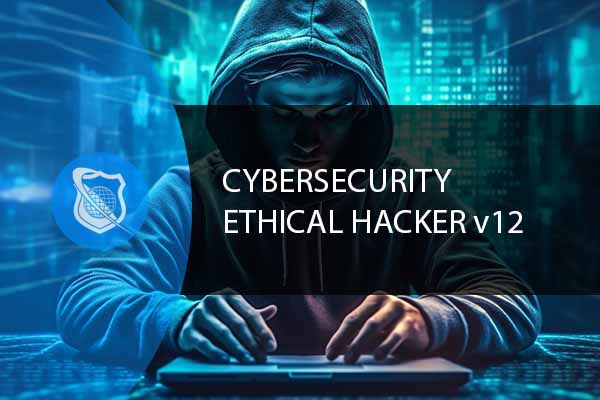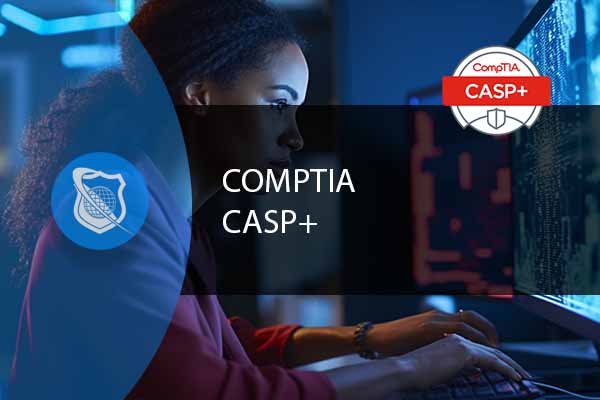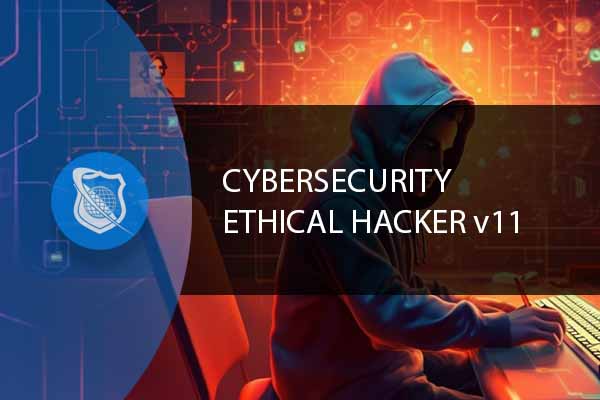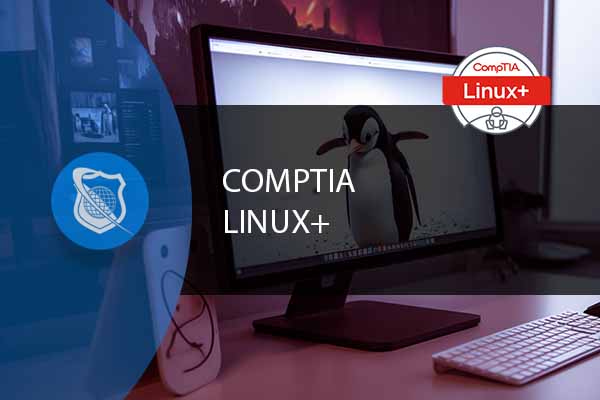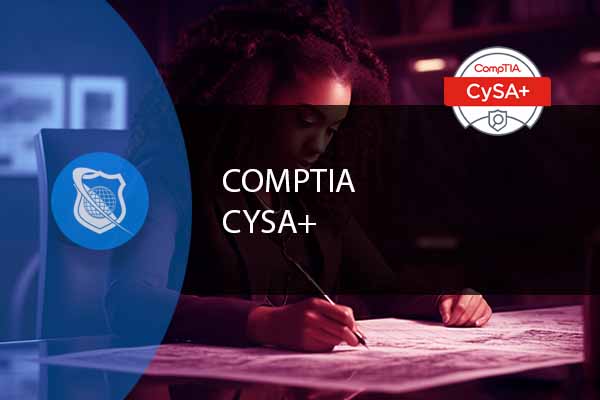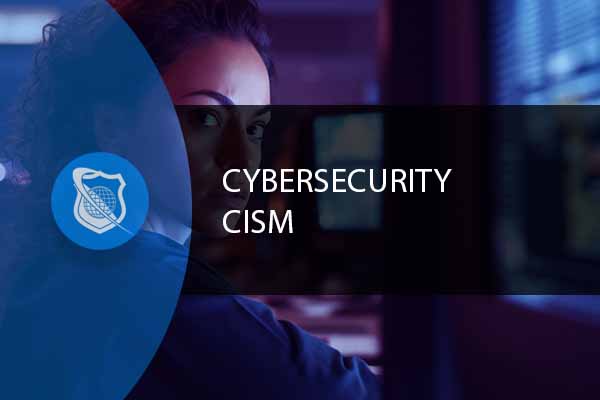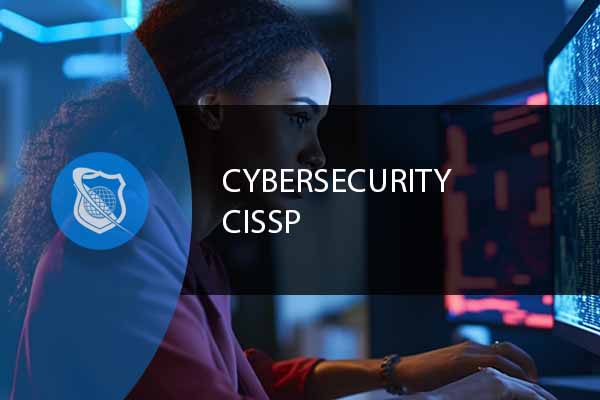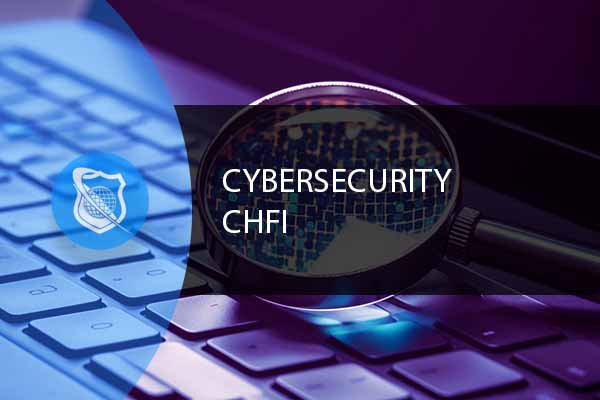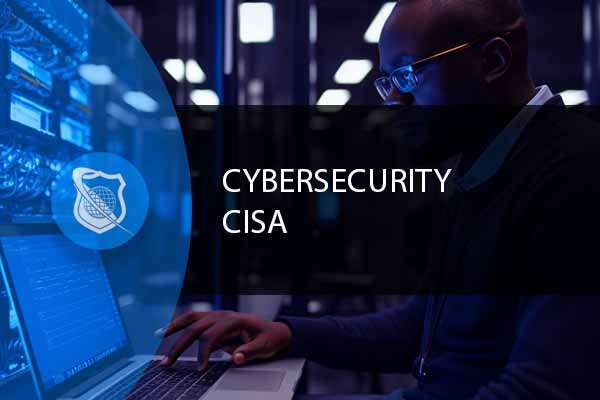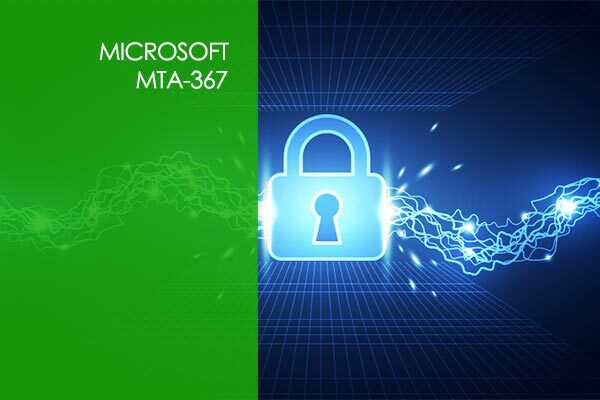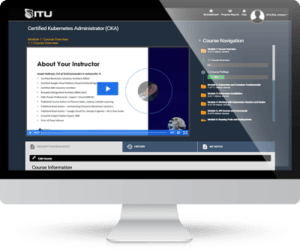- +1 855.488.5327
- customerservice@ituonline.com
- Mon - Fri: 9:00am - 5:00pm ET
Cybersecurity
15 Course Training Series
Become an active participant in one of the hottest areas of Information Technology
Add to cart for an extra 30% off
Over 47,850 students have enrolled
-
15 Courses In This Training Series
Certified Ethical Hacker V12, Security+, CISSP, CYSA+, CISM and more
-
1,600+ Training Videos
Each course provides students with in-depth on-demand videos led by expert trainers
-
330+ Training Hours
The 15 combined courses offer you 246 hours of learning
-
1,900+ Practice Questions
Practice questions, games, flashcards and resources to re-enforce and test your learning
Award-Winning Instruction
CompTIA Security+ SY0-701 Certification Course : Master Cybersecurity Concepts
Master cybersecurity with our Security+ 701 Online Training Course, designed to equip you with essential skills for protecting against digital threats. Ideal for aspiring security specialists, network administrators, and IT auditors, this course is a stepping stone to mastering essential cybersecurity principles and practices.
Certified Ethical Hacker Training for Certification – CEH v12 (Deal)
Certified Ethical Hacker v12 is the latest iteration of EC-Council’s Certified Ethical Hacker v12 series. In this course you will research, discover and scan targets, analyze vulnerabilities and test attack methods and tools. The focus of this course is to solve the challenge of breaking into a target network, collect evidence of success, and escape unnoticed. Every lesson and topic are infused with step-by-step guided practice using real hardware- and software-based hacking tools. Throughout both lecture and hands-on activities, the instructor provides commentary from the field including tips, tricks and hard-learned lessons.
Certified Ethical Hacker (CEH) V12: Your Pathway to CEH Training For Certification
Certified Ethical Hacker v12 is the latest iteration of EC-Council’s Certified Ethical Hacker v12 series. ITU offers CEH training to provide you the tools to research, discover and scan targets, analyze vulnerabilities and test attack methods and tools. The focus of this CEH online training course is to solve the challenge of breaking into a target network, collect evidence of success, and escape unnoticed. Every lesson and topic are infused with step-by-step guided practice using real hardware- and software-based hacking tools. Throughout both lecture and hands-on activities, the instructor, Chrys Thorsen provides commentary from the field including tips, tricks and hard-learned lessons.
Free Certified Ethical Hacker (CEH) V12: Your Pathway to CEH Training For Certification
Certified Ethical Hacker v12 is the latest iteration of EC-Council’s Certified Ethical Hacker v12 series. ITU offers CEH training to provide you the tools to research, discover and scan targets, analyze vulnerabilities and test attack methods and tools. The focus of this CEH online training course is to solve the challenge of breaking into a target network, collect evidence of success, and escape unnoticed. Every lesson and topic are infused with step-by-step guided practice using real hardware- and software-based hacking tools. Throughout both lecture and hands-on activities, the instructor, Chrys Thorsen provides commentary from the field including tips, tricks and hard-learned lessons.
CompTIA CASP Certification: Advanced Security Practitioner
The advanced-level CompTIA CASP+ training course in enterprise environment security (CASP-003) covers risk mitigation, security risks, levels of risks, competency in risk management, enterprise security operations, architecture, research and collaboration, and integration of enterprise security in complex environments.
CompTIA PenTest + PT0-001 : Master Pentesting
In this comprehensive IT course, you’ll acquire in-depth knowledge and practical skills in penetration testing, also known as pentesting, which are crucial for obtaining your pentest certification. The curriculum is designed to cover a wide range of topics, including client engagement, documentation procedures, and both passive and active reconnaissance techniques. You’ll gain expertise in system hacking across various platforms like Windows, Linux, and mobile devices. The course also includes modules on physical security testing and social engineering tactics to assess the resilience of your organization’s human element.
Certified Ethical Hacker (CEH) Version 11
This 3 Course online cyber security ethical hacking program is the first step in becoming an ethical hacker. You will learn advanced hacking concepts how to select the appropriate tools for a cybersecurity penetration test and understand why they work. This class features real-world examples, walkthroughs of scenarios, and hands-on learning opportunities.
CompTIA Linux+ XK0-004 Certification Training
This exam prep IT course will provide you with the knowledge and skills required to configure, manage, operate, and troubleshoot a Linux environment by using security best practices, scripting, and automation computing models. This online course will teach you critical skills needed and objectives covered in the CompTIA Linux+ certification exam.
CompTIA CySA Plus Certification Training
In this course you will gain the CySA+ objectives to prepare for the CySA+ Cert. You’ll learn how to apply behavioral analytics to networks and devices with the intention to prevent, detect, and combat cybersecurity threats via continuous security monitoring. At the conclusion of the course, you’ll have the knowledge needed to pass the CompTIA CySA+ (CS0-002) certification exam, which validates an IT professional’s ability to proactively defend and continuously improve the security of an organization.
CISM CertificationTraining – Certified Information Systems Manager
The CISM certification training course is designed to provide on-the-job skills, as well as knowledge to pass the Certified Information System Manager (CISM) certification exam. This cybersecurity training focuses on more advanced topics and should be completed after various certifications in Cisco and Microsoft have been earned, such as PenTest+ or CySA+.
Certified Cloud Security Professional (CCSP) Training Course
After finishing this Certified Cloud Security Professional (CCSP) training course course, you will be able to design and secure data, applications, and infrastructure in the cloud using advanced technical skills and knowledge.
Certified Information Systems Security Professional (CISSP)
CISSP is the perfect credential for those with advanced technical and managerial skills, experience, and credibility to design, implement, and manage an information security program that can protect organizations from sophisticated attacks.
Computer Hacking Forensics Investigator (CHFI)
This CHFI course will cover the security discipline of computer forensics from a vendor-neutral perspective and work towards preparing students to become Forensic Investigators in Computer Hacking.
Certified Information Systems Auditor (CISA)
CISAs are comparable to what CPAs and CAs are to the accounting industry. They uphold high standards, manage risks, promote compliance, offer solutions, Governance & Management, institute controls and deliver enterprise value. Due to their audit experience skillset and credibility CISAs are recognized internationally as professionals in this field.
Microsoft MTA 98-367
Ready to jumpstart your tech career? The Microsoft MTA 98-367 – Security Fundamentals course provides the necessary skills and knowledge for you to ace the Microsoft MTA 98-367 exam. Developed by experts, this training offers a comprehensive overview of essential technology concepts from Microsoft Technology Associate (MTA) certification exams which are set up to verify basic understandings needed when beginning work with Windows technologies.
CompTIA Security+ SY0-701 Certification Course : Master Cybersecurity Concepts
Master cybersecurity with our Security+ 701 Online Training Course, designed to equip you with essential skills for protecting against digital threats. Ideal for aspiring security specialists, network administrators, and IT auditors, this course is a stepping stone to mastering essential cybersecurity principles and practices.
Certified Ethical Hacker Training for Certification – CEH v12 (Deal)
Certified Ethical Hacker v12 is the latest iteration of EC-Council’s Certified Ethical Hacker v12 series. In this course you will research, discover and scan targets, analyze vulnerabilities and test attack methods and tools. The focus of this course is to solve the challenge of breaking into a target network, collect evidence of success, and escape unnoticed. Every lesson and topic are infused with step-by-step guided practice using real hardware- and software-based hacking tools. Throughout both lecture and hands-on activities, the instructor provides commentary from the field including tips, tricks and hard-learned lessons.
Certified Ethical Hacker (CEH) V12: Your Pathway to CEH Training For Certification
Certified Ethical Hacker v12 is the latest iteration of EC-Council’s Certified Ethical Hacker v12 series. ITU offers CEH training to provide you the tools to research, discover and scan targets, analyze vulnerabilities and test attack methods and tools. The focus of this CEH online training course is to solve the challenge of breaking into a target network, collect evidence of success, and escape unnoticed. Every lesson and topic are infused with step-by-step guided practice using real hardware- and software-based hacking tools. Throughout both lecture and hands-on activities, the instructor, Chrys Thorsen provides commentary from the field including tips, tricks and hard-learned lessons.
Free Certified Ethical Hacker (CEH) V12: Your Pathway to CEH Training For Certification
Certified Ethical Hacker v12 is the latest iteration of EC-Council’s Certified Ethical Hacker v12 series. ITU offers CEH training to provide you the tools to research, discover and scan targets, analyze vulnerabilities and test attack methods and tools. The focus of this CEH online training course is to solve the challenge of breaking into a target network, collect evidence of success, and escape unnoticed. Every lesson and topic are infused with step-by-step guided practice using real hardware- and software-based hacking tools. Throughout both lecture and hands-on activities, the instructor, Chrys Thorsen provides commentary from the field including tips, tricks and hard-learned lessons.
CompTIA CASP Certification: Advanced Security Practitioner
The advanced-level CompTIA CASP+ training course in enterprise environment security (CASP-003) covers risk mitigation, security risks, levels of risks, competency in risk management, enterprise security operations, architecture, research and collaboration, and integration of enterprise security in complex environments.
CompTIA PenTest + PT0-001 : Master Pentesting
In this comprehensive IT course, you’ll acquire in-depth knowledge and practical skills in penetration testing, also known as pentesting, which are crucial for obtaining your pentest certification. The curriculum is designed to cover a wide range of topics, including client engagement, documentation procedures, and both passive and active reconnaissance techniques. You’ll gain expertise in system hacking across various platforms like Windows, Linux, and mobile devices. The course also includes modules on physical security testing and social engineering tactics to assess the resilience of your organization’s human element.
Certified Ethical Hacker (CEH) Version 11
This 3 Course online cyber security ethical hacking program is the first step in becoming an ethical hacker. You will learn advanced hacking concepts how to select the appropriate tools for a cybersecurity penetration test and understand why they work. This class features real-world examples, walkthroughs of scenarios, and hands-on learning opportunities.
CompTIA Linux+ XK0-004 Certification Training
This exam prep IT course will provide you with the knowledge and skills required to configure, manage, operate, and troubleshoot a Linux environment by using security best practices, scripting, and automation computing models. This online course will teach you critical skills needed and objectives covered in the CompTIA Linux+ certification exam.
CompTIA CySA Plus Certification Training
In this course you will gain the CySA+ objectives to prepare for the CySA+ Cert. You’ll learn how to apply behavioral analytics to networks and devices with the intention to prevent, detect, and combat cybersecurity threats via continuous security monitoring. At the conclusion of the course, you’ll have the knowledge needed to pass the CompTIA CySA+ (CS0-002) certification exam, which validates an IT professional’s ability to proactively defend and continuously improve the security of an organization.
CISM CertificationTraining – Certified Information Systems Manager
The CISM certification training course is designed to provide on-the-job skills, as well as knowledge to pass the Certified Information System Manager (CISM) certification exam. This cybersecurity training focuses on more advanced topics and should be completed after various certifications in Cisco and Microsoft have been earned, such as PenTest+ or CySA+.
Certified Cloud Security Professional (CCSP) Training Course
After finishing this Certified Cloud Security Professional (CCSP) training course course, you will be able to design and secure data, applications, and infrastructure in the cloud using advanced technical skills and knowledge.
Certified Information Systems Security Professional (CISSP)
CISSP is the perfect credential for those with advanced technical and managerial skills, experience, and credibility to design, implement, and manage an information security program that can protect organizations from sophisticated attacks.
Computer Hacking Forensics Investigator (CHFI)
This CHFI course will cover the security discipline of computer forensics from a vendor-neutral perspective and work towards preparing students to become Forensic Investigators in Computer Hacking.
Certified Information Systems Auditor (CISA)
CISAs are comparable to what CPAs and CAs are to the accounting industry. They uphold high standards, manage risks, promote compliance, offer solutions, Governance & Management, institute controls and deliver enterprise value. Due to their audit experience skillset and credibility CISAs are recognized internationally as professionals in this field.
Microsoft MTA 98-367
Ready to jumpstart your tech career? The Microsoft MTA 98-367 – Security Fundamentals course provides the necessary skills and knowledge for you to ace the Microsoft MTA 98-367 exam. Developed by experts, this training offers a comprehensive overview of essential technology concepts from Microsoft Technology Associate (MTA) certification exams which are set up to verify basic understandings needed when beginning work with Windows technologies.
Don't Take Our Word for It
Accolades from our customers, from CEOs to IT managers to students.
Frequently Asked Questions About Cybersecurity Careers
Security Analyst: Responsible for monitoring and analyzing security systems to identify and respond to potential threats and vulnerabilities.
Ethical Hacker/Penetration Tester: Conducts authorized simulated cyber attacks on systems and networks to identify weaknesses and vulnerabilities.
Security Consultant: Provides expert advice and guidance to organizations on developing and implementing security strategies, policies, and procedures.
Incident Responder: Responds to and manages cybersecurity incidents, investigates breaches, and implements measures to prevent future occurrences.
Security Engineer: Designs and implements security systems and controls, including firewalls, intrusion detection systems, and encryption protocols.
Cryptographer: Develops and implements cryptographic algorithms and protocols to secure data and communications.
Security Architect: Designs and builds secure network and system architectures, ensuring the integration of effective security measures.
Security Operations Center (SOC) Analyst: Monitors and analyzes security events and alerts, performs incident triage, and coordinates response activities.
Threat Intelligence Analyst: Collects and analyzes data to identify emerging threats, trends, and vulnerabilities, providing actionable intelligence to organizations.
Security Auditor: Conducts audits and assessments of security controls, policies, and procedures to ensure compliance with regulations and industry best practices.
Forensic Analyst: Investigates and analyzes digital evidence related to cybersecurity incidents, gathering information for legal and incident response purposes.
Security Manager: Oversees the development and implementation of security programs, policies, and procedures, and manages the security team.
Security Awareness and Training Specialist: Develops and delivers cybersecurity awareness and training programs to educate employees about security risks and best practices.
Secure Software Developer: Designs and develops software with built-in security measures and conducts code reviews to identify and fix vulnerabilities.
Data Privacy Officer: Ensures compliance with data protection regulations, develops privacy policies, and advises on data privacy issues within an organization.
These are just a few examples, and the field of cybersecurity offers a wide range of roles and specializations.
The average salary range for a job in cybersecurity can vary depending on factors such as job title, experience level, location, industry, and the specific skills required. However, I can provide you with a general idea of the salary ranges for different positions in cybersecurity based on data up until my knowledge cutoff in September 2021:
Cybersecurity Analyst/Engineer: The average salary range for a cybersecurity analyst/engineer can vary from around $60,000 to $130,000 per year, depending on the factors mentioned above.
Security Consultant: Security consultants typically have more experience and expertise in cybersecurity. Their average salary range can range from approximately $80,000 to $150,000 per year.
Penetration Tester/Ethical Hacker: Penetration testers or ethical hackers are responsible for identifying vulnerabilities in systems and networks. Their average salary range can vary from about $70,000 to $150,000 per year.
Security Architect: Security architects design and build secure systems and networks. Their average salary range is usually higher and can range from around $90,000 to $160,000 per year.
Chief Information Security Officer (CISO): CISOs are executives responsible for an organization’s overall cybersecurity strategy. Due to their high-level position, CISOs generally command higher salaries. Their average salary range can vary from $150,000 to $300,000 or more per year.
It’s important to note that these salary ranges are approximate and can vary significantly based on factors such as location, industry, company size, and individual qualifications. Additionally, the cybersecurity field is constantly evolving, and the demand for skilled professionals may influence salary ranges over time.
While having prior experience in IT can certainly be beneficial, it is not always a strict requirement to start a job in cybersecurity. Cybersecurity is a rapidly evolving field with a wide range of roles and responsibilities, and many employers are open to hiring individuals with diverse backgrounds.
Here are a few paths you can consider if you’re interested in starting a career in cybersecurity without prior IT experience:
Education and Certifications: Pursue a formal education in cybersecurity or a related field such as computer science, information systems, or network security. Many universities and colleges offer cybersecurity programs at various levels, including undergraduate and graduate degrees. Additionally, acquiring industry-recognized certifications like CompTIA Security+, Certified Information Systems Security Professional (CISSP), or Certified Ethical Hacker (CEH) can enhance your credibility and knowledge in the field.
Self-Study and Online Resources: There are numerous online resources, tutorials, and training platforms available that can help you gain knowledge and skills in cybersecurity. Explore websites like Cybrary, Coursera, Udemy, or edX, which offer a variety of cybersecurity courses and learning paths for beginners.
Entry-Level Positions: Look for entry-level positions in cybersecurity such as security analyst, security operations center (SOC) analyst, or security administrator. These roles often provide on-the-job training and can serve as a starting point for gaining practical experience in the field.
Internships and Apprenticeships: Consider applying for internships or apprenticeship programs offered by cybersecurity companies or organizations. These programs can provide valuable hands-on experience, mentorship, and networking opportunities.
Networking and Community Involvement: Attend cybersecurity conferences, meetups, and events to connect with professionals in the field. Engaging with the cybersecurity community can help you stay updated on the latest trends, technologies, and job opportunities.
While starting a career in cybersecurity without IT experience may require some additional effort to acquire the necessary knowledge and skills, it is certainly possible with dedication, self-study, and a passion for the field. Remember to continuously learn and stay updated on evolving threats and technologies to thrive in this dynamic industry.
Certified Expert Instructors
We demand excellence from our core instructors. Every instructor must have a minimum of 10 years experience in their respective fields and are recognized as experts.
Flexible Learning Options
Our exclusive learning management system allows students to learn with flexibility. Learn anywhere at any time on desktop, tablet or mobile. All you needs is an internet connection to start learning today.
Extensive Content
ITU has invested over 10 years in developing our extensive library of IT focused training. Plus, with our All Access program, receive free and updated courses at no additional cost.














